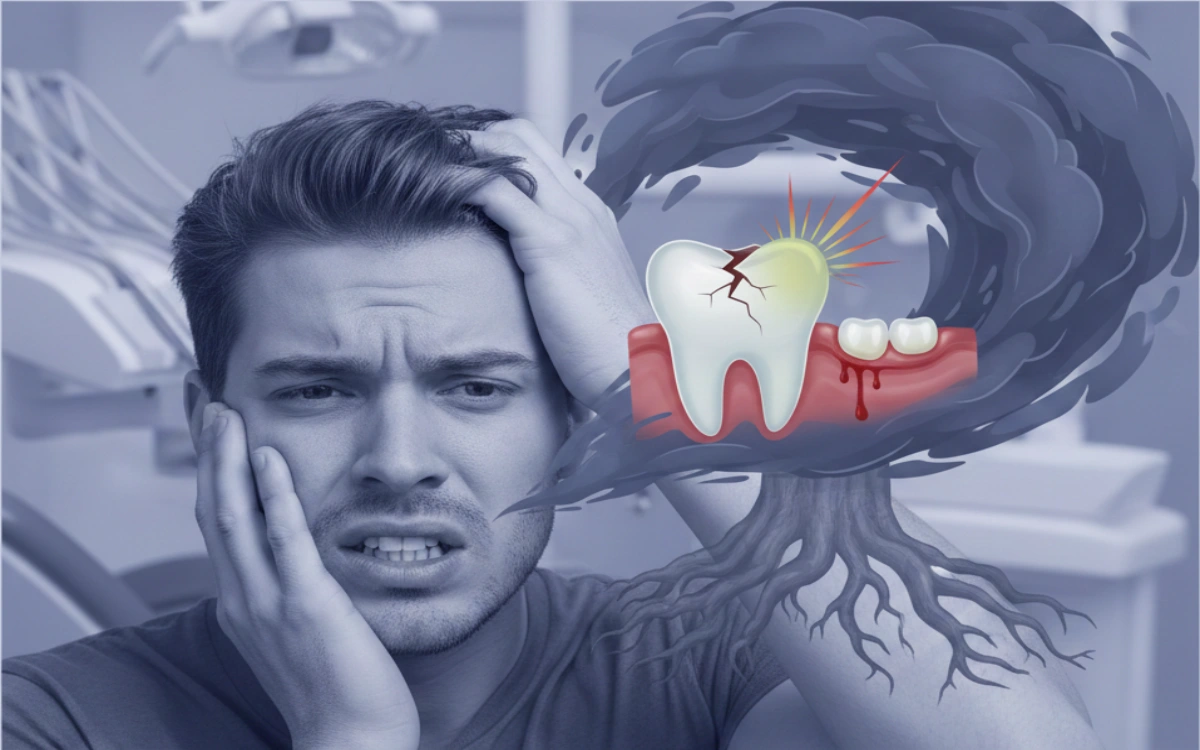Milk teeth, also known as baby teeth or deciduous teeth, play a vital role in your child’s oral health and development. These first teeth not only help your child chew and speak but also act as placeholders for their permanent teeth. At The Dome MedDental Clinic, we understand how important it is to care for milk teeth from the moment they appear. In this blog, we’ll guide you through everything you need to know about milk teeth, including their development, care, and common issues, to help your child maintain a healthy, happy smile.
What Are Milk Teeth?
Milk teeth, also known as deciduous or baby teeth, are the first set of teeth that develop in a child’s mouth. These small, temporary teeth play a crucial role in a child’s early oral development, aiding in chewing, speech, and maintaining space for the permanent teeth that will follow. While they are eventually replaced by adult teeth, milk teeth are essential for setting the foundation for lifelong oral health.
Definition of Milk Teeth
Milk teeth are the first teeth to emerge in a child’s mouth, typically starting around six months of age. They are called "deciduous" because they are temporary and are naturally shed as a child grows. These teeth are smaller and whiter compared to permanent teeth, designed to fit a child’s smaller jaw size.
How Many Milk Teeth Do Children Have?
Children typically develop a total of 20 milk teeth—10 in the upper jaw and 10 in the lower jaw. These teeth are categorized as follows:
- 4 Central Incisors: For biting into soft foods.
- 4 Lateral Incisors: Assist in tearing food.
- 4 Canines: Help with ripping and tearing food into smaller pieces.
- 8 Molars: Critical for grinding and chewing food.
Milk teeth begin to appear around six months of age and are fully developed by the time a child is about three years old. Understanding the timeline and structure of milk teeth is key to ensuring your child’s oral health is on track.
When Do Milk Teeth Emerge and Fall Out?
Milk teeth follow a specific timeline for their emergence and eventual replacement by permanent teeth. Understanding this timeline helps parents monitor their child’s oral development and identify any potential issues early on. At The Dome MedDental Clinic, we guide parents through every stage of their child’s dental journey to ensure a healthy and confident smile.
Timeline for Milk Teeth Development
Milk teeth typically start to appear when a baby is about 6 months old. Here’s a general timeline for their eruption:
- 6–10 Months: The lower central incisors (front teeth) usually emerge first.
- 8–12 Months: The upper central incisors appear, completing the first stage of your baby’s smile.
- 9–13 Months: The upper lateral incisors emerge, followed by the lower lateral incisors at 10–16 months.
- 16–23 Months: The canines (pointed teeth) come in.
- 13–33 Months: The first and second molars fill in, completing the set of 20 milk teeth by around age 3.
Every child is unique, and variations in timing are normal. However, if your child’s teeth are significantly delayed, it’s best to consult with our pediatric dentists for a professional evaluation.
When Do Milk Teeth Start to Fall Out?
Milk teeth begin to fall out around the age of 6, making way for permanent teeth. The process typically follows this pattern:
- 6–7 Years: The lower and upper central incisors are the first to shed.
- 7–8 Years: The lateral incisors fall out, allowing the permanent ones to grow in.
- 9–12 Years: Canines and first molars are replaced by their permanent counterparts.
- 10–12 Years: The second molars are the last to shed, completing the transition to permanent teeth.
It’s important to monitor this process closely. Early loss of milk teeth due to decay or trauma can lead to spacing issues or misaligned permanent teeth. Our team at The Dome MedDental Clinic specializes in guiding parents through this transition and addressing any concerns.
Why Are Milk Teeth Important?
Milk teeth may be temporary, but their role in a child’s oral and overall development is crucial. At The Dome MedDental Clinic, we emphasize the significance of milk teeth in ensuring healthy growth and preparing the foundation for strong permanent teeth. Understanding their importance helps parents take better care of their child’s first set of teeth.
Role in Chewing and Speech Development
Milk teeth play a key role in helping children develop essential functions such as chewing and speaking:
- Chewing and Digestion: Milk teeth allow children to chew and break down food properly, aiding in digestion and ensuring they receive adequate nutrition for healthy growth. Without them, children may struggle to eat a balanced diet.
- Speech Development: Teeth are vital for forming sounds and words clearly. Milk teeth help children pronounce letters like “T,” “D,” and “S” and support the development of proper speech patterns. Issues with milk teeth can sometimes lead to speech delays or difficulties.
Maintaining Space for Permanent Teeth
Milk teeth act as placeholders for permanent teeth, guiding them into their proper positions as they grow. This ensures the correct alignment of the jaw and minimizes the risk of overcrowding or misalignment.
If a milk tooth is lost too early due to decay or injury, the adjacent teeth may shift into the empty space, causing problems for the underlying permanent teeth. This can lead to spacing issues, requiring orthodontic treatments later in life.
At The Dome MedDental Clinic, our pediatric dentistry team provides preventive and restorative care to maintain the health and alignment of your child’s milk teeth, ensuring a smooth transition to their permanent smile.
How to Care for Milk Teeth
Caring for milk teeth is essential for maintaining your child’s oral health and ensuring their permanent teeth develop properly. At The Dome MedDental Clinic, we guide parents on the best practices for keeping their child’s milk teeth clean, strong, and healthy.
Tips for Cleaning Your Baby’s Teeth
- Start Early
Begin cleaning your baby’s gums even before their first tooth emerges. Use a soft, damp cloth to gently wipe their gums after feedings to remove bacteria. - Use the Right Tools
Once the first tooth appears, switch to a soft-bristled toothbrush designed for infants. Use a smear of fluoride toothpaste (about the size of a grain of rice) to clean their teeth twice a day. - Teach Proper Techniques
As your child grows, teach them to brush their teeth gently in circular motions and to spit out the toothpaste. Always supervise brushing until they can do it effectively on their own, usually around age 6. - Don’t Forget Flossing
Begin flossing your child’s teeth as soon as they have two teeth that touch. This helps remove food particles and plaque between teeth where brushing can’t reach. - Schedule Regular Dental Visits
Schedule your child’s first dental visit by their first birthday or when their first tooth appears. Regular check-ups at The Dome MedDental Clinic ensure that their teeth and gums remain healthy.
Foods and Habits to Protect Milk Teeth
- Choose Tooth-Friendly Foods
- Include: Fruits, vegetables, dairy products (like cheese and yogurt), and foods rich in calcium and vitamins.
- Avoid: Sugary snacks, candies, and acidic beverages that can erode enamel and cause cavities.
- Encourage Healthy Habits
- Offer water instead of sugary drinks, especially before bedtime.
- Limit snacking between meals to reduce the risk of tooth decay.
- Avoid Prolonged Bottle Use
Prolonged bottle feeding, especially at night, can cause baby bottle tooth decay. Transition to a sippy cup by the time your child turns one. - Protect Against Injuries
Encourage your child to use a mouthguard during sports or active play to prevent damage to their teeth.
By following these tips, you can help your child develop strong, healthy milk teeth that will pave the way for a lifetime of good oral health. For personalized advice, schedule a visit with our pediatric dental specialists at The Dome MedDental Clinic today.
Common Issues with Milk Teeth and How to Address Them
Milk teeth play a vital role in your child’s oral health, but they are not immune to problems. At The Dome MedDental Clinic, we frequently treat common issues with milk teeth to ensure your child’s smile remains healthy and functional. Here are some of the most common challenges and how to address them.
Tooth Decay in Children
Tooth decay is one of the most prevalent issues affecting milk teeth. It often results from frequent exposure to sugary foods and drinks or poor oral hygiene.
Signs of Tooth Decay:
- White or brown spots on the teeth.
- Sensitivity to hot, cold, or sweet foods.
- Visible cavities or holes in the teeth.
How to Address It:
- Schedule regular dental cleanings and check-ups to catch decay early.
- Treat minor cavities with fillings or fluoride treatments.
- In severe cases, crowns may be necessary to protect the tooth.
For more information, visit our General Dentistry page.
Early Loss of Milk Teeth
Milk teeth act as placeholders for permanent teeth, and losing them prematurely can disrupt the alignment of the adult teeth.
Causes of Early Loss:
- Severe tooth decay or infection.
- Trauma from falls or injuries.
How to Address It:
- Use space maintainers to prevent neighboring teeth from shifting into the empty space.
- Regular dental visits can monitor your child’s development and ensure the permanent teeth have enough room to grow properly.
Misalignment and Space Issues
Crowded or misaligned milk teeth can lead to bite problems and difficulties with chewing or speech development.
Signs of Misalignment:
- Overlapping or crooked teeth.
- Difficulty biting or chewing food evenly.
How to Address It:
- Early orthodontic assessments can identify alignment issues.
- Pediatric braces or aligners may be recommended to guide the teeth into proper positions.
Learn more about our Orthodontic Treatments for children.
When to Visit the Dentist for Milk Teeth Care
Regular dental visits are crucial for maintaining the health of your child’s milk teeth and ensuring proper oral development. At The Dome MedDental Clinic, we recommend starting dental care early and scheduling consistent check-ups to monitor your child’s oral health.
First Dental Visit Recommendations
Your child’s first dental visit should take place by their first birthday or within six months of their first tooth erupting. Early visits help establish a foundation for good oral hygiene and allow our pediatric dentists to:
- Check for any developmental abnormalities.
- Provide guidance on cleaning your child’s teeth.
- Discuss dietary tips to prevent tooth decay.
Early visits also help your child become familiar with the dental environment, reducing fear or anxiety about future appointments.
Regular Check-Ups for Healthy Smiles
Once your child’s milk teeth have started to emerge, we recommend scheduling dental check-ups every six months. These regular visits allow us to:
- Monitor Growth and Development: Ensure teeth are erupting on time and in the correct alignment.
- Prevent Cavities: Clean teeth professionally to remove plaque and tartar buildup, and apply fluoride treatments if needed.
- Address Issues Early: Detect and treat problems like decay or misalignment before they become severe.
For children with specific dental concerns, such as frequent cavities or orthodontic issues, more frequent visits may be recommended.
Emergency Visits for Milk Teeth Care
In addition to routine check-ups, certain situations require immediate dental attention:
- Severe Tooth Pain: Persistent pain could indicate decay or an infection.
- Trauma or Injury: If a tooth is knocked out or damaged due to an accident.
- White or Brown Spots on Teeth: These could be early signs of decay and should be evaluated promptly.
Milk teeth are the foundation of your child’s oral health, playing a critical role in their development and overall well-being. By understanding how to care for them and addressing any issues early, you can help your child maintain a healthy, confident smile. At The Dome MedDental Clinic, we specialize in providing comprehensive pediatric dental care tailored to your child’s unique needs. From preventive treatments to managing common issues like tooth decay and misalignment, our expert team is here to support you every step of the way.
Don’t wait to give your child the best start in their dental journey. Book a consultation today and let us help your child achieve a lifetime of healthy, happy smiles. Visit our website or call us to schedule an appointment at our Dubai clinic.






